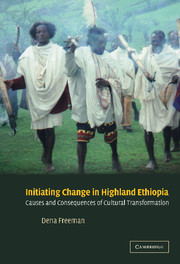Book contents
- Frontmatter
- Contents
- List of illustrations
- Acknowledgements
- Select glossary
- 1 Introduction: theorising change
- 2 The recent history of the Gamo Highlands
- 3 Production and reproduction
- 4 The sacrificial system
- 5 The initiatory system
- 6 Experiencing change
- 7 Assemblies and incremental cultural change
- 8 Transformation versus devolution: the organisational dynamics of change
- Notes
- Bibliography
- Index
6 - Experiencing change
Published online by Cambridge University Press: 22 September 2009
- Frontmatter
- Contents
- List of illustrations
- Acknowledgements
- Select glossary
- 1 Introduction: theorising change
- 2 The recent history of the Gamo Highlands
- 3 Production and reproduction
- 4 The sacrificial system
- 5 The initiatory system
- 6 Experiencing change
- 7 Assemblies and incremental cultural change
- 8 Transformation versus devolution: the organisational dynamics of change
- Notes
- Bibliography
- Index
Summary
This chapter seeks to understand the forces of change in twentieth-century Doko life. The external drivers of this change have already been discussed in chapter 2, where the historical events of this period were described in some detail. The task in front of us now is to consider how these changes were experienced by people in Doko and how they impacted on cultural life, particularly on the two sets of practices that I have called the sacrificial system and the initiatory system.
Changing production patterns
Let us start by considering the situation in the nineteenth century. At this time the inheritance system was heavily skewed in favour of genealogical seniors. The eldest son inherited half his father's land, while younger sons divided the rest equally among themselves. Assuming this pattern of inheritance had been in place for at least a few generations, it would have resulted in a vastly unequal distribution of land amongst people in Doko. Eldest sons of eldest sons would have owned far more land than their more junior cousins, and the descendants of elder brothers and senior lines in general would be favoured over the descendants of younger brothers and junior lines. In a family where each man had three sons, for example, the eldest son of the eldest son of the eldest son would own almost ten times as much land as his most junior cousin, after only four generations.
- Type
- Chapter
- Information
- Initiating Change in Highland EthiopiaCauses and Consequences of Cultural Transformation, pp. 114 - 129Publisher: Cambridge University PressPrint publication year: 2002



